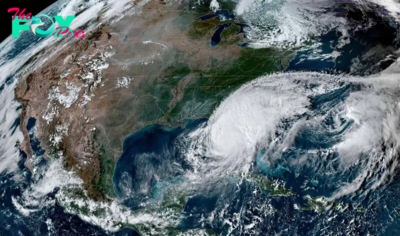Science
Tree rings reveal summer 2023 was the hottest in 2 millennia
Last year's summer was the hottest in 2,000 years, ancient tree rings reveal.
Researchers already knew that 2023 was one for the books, with average temperatures soaring past anything recorded since 1850. But there are no measurements stretching further back than that date, and even the available data is patchy, according to a study published Tuesday (May 14) in the journal Nature. So, to determine whether 2023 was an exceptionally hot year relative to the millennia that preceded it, the study authors turned to records kept by nature.
Trees provide a snapshot of past climates, because they are sensitive to changes in rainfall and temperature. This information is crystalized in their growth rings, which grow wider in warm, wet years than they do in cold, dry years. The scientists examined available tree-ring data dating back to the height of the Roman Empire and concluded that 2023 really was a standout, even when accounting for natural variations in climate over time.
"When you look at the long sweep of History, you can see just how dramatic recent global warming is," co-author Ulf Büntgen, a professor of environmental systems analysis at the University of Cambridge in the U.K., said in a statement. The data indicated that "2023 was an exceptionally hot year, and this trend will continue unless we reduce greenhouse gas emissions dramatically," he said.
Temperatures recorded during the summer of 2023 exceeded those of the coldest summer in the past 2,000 years, in A.D. 536, by 7 degrees Fahrenheit (3.9 degrees Celsius). That relatively cool summer followed a volcanic eruption that dumped huge amounts of sunlight-blocking sulfur particles into the stratosphere, which triggered global cooling, according to the study.
Related: 'We were in disbelief': Antarctica is behaving in a way we've never seen before. Can it recover?
Büntgen and his colleagues also compared the tree-ring data with written temperature records from the 19th century. Climate change is evaluated against a baseline average temperature that prevailed before the Industrial Revolution, and it turns out that temperatures around 1850 were slightly colder than previously thought, the researchers found.
-

 Science2d ago
Science2d agoInside Capitol Hill’s Latest UFO Hearings
-

 Science2d ago
Science2d agoYou Won’t Want to Miss the Leonid Meteor Shower. Here’s How and When You Can See It
-

 Science3d ago
Science3d agoHere’s What Trump’s Win Means for NASA
-

 Science6d ago
Science6d agoWhy Risky Wildfire Zones Have Been Increasing Around the World
-

 Science6d ago
Science6d agoIt’s Time to Redefine What a Megafire Is in the Climate Change Era
-

 Science1w ago
Science1w ago4 Astronauts Return to Earth After Being Delayed by Boeing’s Capsule Trouble and Hurricane Milton
-

 Science1w ago
Science1w agoThe Elegance and Awkwardness of NASA’s New Moon Suit, Designed by Axiom and Prada
-

 Science1w ago
Science1w agoSpaceX Launches Its Mega Starship Rocket. This Time, Mechanical Arms Catch It at Landing



























